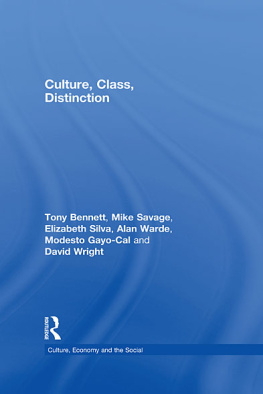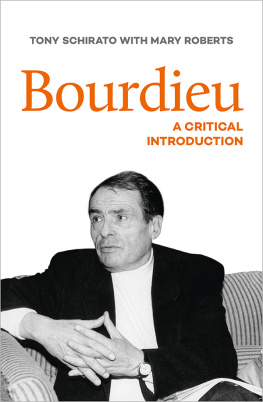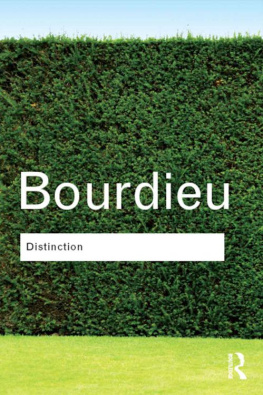Cultural Consumption, Classification and Power
When social scientists in the 1970s began to identify the positive and constructive role of cultural practices in the operation of power, Pierre Bourdieu advanced a highly influential and subsequently controversial account. Most notably in Distinction, he charted the connections between cultural taste and practice and social classification. This book seeks to evaluate, develop and transcend the ideas that Bourdieu explored in Distinction. Taken together the papers compare and contrast different theoretical and conceptual approaches, bring empirical investigations to bear on relevant theoretical issues, drawing on different national experiences (France, UK, Canada, Central Africa), and attend to aspects of the relationship between culture and power with reference to gender and ethnicity as well as class. Thus the book contributes to the ongoing international debates across the social sciences about Bourdieus legacy and the current role of cultural practice in social reproduction.
This book was published as a special edition of Journal of Cultural Economy.
Alan Warde is Professor of Sociology at the University of Manchester. His interests include the sociology of culture and the sociology of consumption. Among his recent books are: Culture, Class, Distinction, (Routledge, 2009), and Cultural Analysis and the Legacy of Bourdieu: settling accounts and developing alternatives, (Routledge, 2010).
First published 2011 by Routledge
2 Park Square, Milton Park, Abingdon, Oxon OX14 4RN
Simultaneously published in the USA and Canada
by Routledge
711 Third Avenue, New York, NY 10017
Routledge is an imprint of the Taylor & Francis Group, an informa business
2011 Taylor & Francis
This book is a reproduction of Journal of Cultural Economy 1.3. The Publisher requests to those authors who may be citing this book to state, also, the bibliographical details of the special issue on which the book was based
Typeset in Times New Roman by Taylor & Francis Books
All rights reserved. No part of this book may be reprinted or reproduced or utilised in any form or by any electronic, mechanical, or other means, now known or hereafter invented, including photocopying and recording, or in any information storage or retrieval system, without permission in writing from the publishers.
British Library Cataloguing in Publication Data
A catalogue record for this book is available from the British Library
ISBN13: 978-0-415-61471-9
Disclaimer
The publisher would like to make readers aware that the chapters in this book are referred to as articles as they had been in the special issue. The publisher accepts responsibility for any inconsistencies that may have arisen in the course of preparing this volume for print.
Contents
Alan Warde
Steph Lawler
Michle Ollivier
Philippe Coulangeon
Jean-Pascal Daloz
Alan Warde
Philippe Coulangeon is a French sociologist. His research mainly concerns the sociology of culture and of cultural practices in relation to the broader issues of social stratification. His recent publications are focused on the social and cultural consequences of school expansion in France and other western countries. He also addresses the question of the continuing social relevance of changing cultural and aesthetic divides in the contemporary building of symbolic boundaries between social classes.
Jean-Pascal Daloz is a Senior CNRS Fellow (MFO, Oxford University), Professor (II) at the University of Oslo, and Chair of the Research Committee on Comparative Sociology of the International Sociological Association. He is a comparativist specialized in the study of elites and has a substantial research and publications record (11 books) in both Comparative Politics and Comparative Sociology. His current research focuses on political actors ostentation/modesty and on the comparative study of social distinction. He is completing a monograph for Palgrave on The Sociology of Elite Distinction.
Steph Lawler is a Senior Lecturer in Sociology at Newcastle University. She has written widely on social identities, especially those of class, gender and generation. Her latest book is Identity: Sociological Perspectives (Polity, 2008).
The late Michle Ollivier was professor of sociology at the University of Ottawa. Her most recent research focused on tastes and cultural consumption in relation to class and gender inequality with a special interest in the uses of the rhetoric of openness to cultural diversity in different fields. She had also recently edited, with Koen van Eijck and Alan Warde, Models of Omnivorous Consumption: New Directions in Research, a special edition of Poetics, vol. 36, nos 2_3 (2008).
Alan Warde is Professor of Sociology at the University of Manchester. He has research interests in the sociology of culture, the sociology of consumption and social stratification. His most recent book, with Tony Bennett, Mike Savage, Elizabeth Silva, Modesto Gayo-Cal and David Wright, is Capital, Class, Distinction (Routledge, 2008), a work addressing similar issues to Bourdieus Distinction in respect of contemporary Britain. He has also recently edited, with Michle Ollivier and Koen van Eijck, Models of Omnivorous Consumption: New Directions in Research, a special edition of Poetics, vol. 36, nos 23 (2008).
Alan Warde
In the wake of economism, social scientists in the 1970s began to identify the complicit role of cultural practices in the operation of power. Cultural cognition, competence and commitment, captured by concepts like hegemony, discourse and cultural capital, were pulled to the centre of explanations of social domination. Bourdieu, unique in the breadth of his appeal across disciplinary boundaries, supplied a highly influential model of the relationship between culture and power. He charted the connections between cultural taste and practice and social classification. He proposed that since dominant classes regularly succeed in establishing that their own cultural practice is intrinsically of superior quality, and is a marker of social superiority, taste comes to play a central role in not only representing but also reproducing social divisions.
Bourdieus legacy remains enormously controversial. The articles in this issue arise from a symposium devoted to assessing ways to move the theory of taste forward.1 Their shared focus is how to evaluate and develop, or to transcend, the ideas and subject matter that Bourdieu explored in Distinction. They rehearse some of the criticisms of the work of Bourdieu and review available alternative theoretical standpoints. Taken together, the papers compare and contrast different theoretical and conceptual approaches, bringing empirical investigations to bear on relevant theoretical issues, drawing on different national experiences, and attending to aspects of the relationship between culture and power with reference to gender and generation as well as class. Some contributors think that there is no future at all in the approach of Bourdieu; others think that there is reason to work with him. But all are inspired. Bourdieus work proves enormously fruitful, for he seems as good to argue against as he is to agree with.
The principal point of departure, Distinction: A social critique of the judgment of taste, is probably the most widely cited empirical sociological monograph ever published. It is too well known, and also so complex, that I make no attempt to summarize its content or impose a definitive reading among the many competing exegeses. The influence and reputation of





